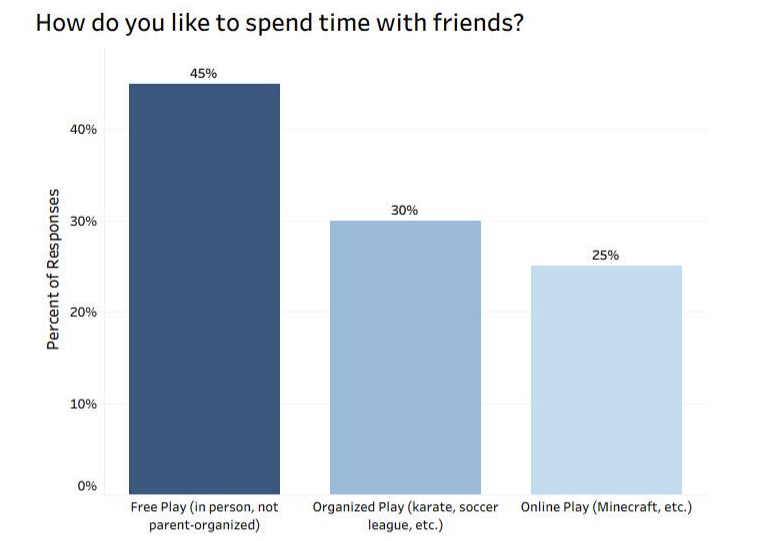Kids Don't Want Screens—They Want Freedom
A new poll finds that children crave real-world play with friends, not more screen time. But we’ve made that nearly impossible.

Kids love being on their phones and would rather do that than anything else. Right?
New research finds that this is a myth. Children reported that what they really want to do is hang out with friends in real life—with no adults hovering and no screens. Kids go online because that's generally the only place they can meet up and have fun without constant adult supervision. Being glued to screens is their default, not their desire.
In an August 4 Atlantic piece I cowrote with Jonathan Haidt, author of The Anxious Generation (and my Let Grow cofounder), and Zach Rausch, director of the Tech and Society Research Lab at New York University, we discuss the survey we conducted with The Harris Poll. We asked 500 kids aged 8 to 12 to pick their favorite way to spend time with friends. The choices were: unstructured play, like pick-up basketball or exploring the neighborhood; adult-led activities, like ballet or soccer; and socializing online.
The results surprised many people.

It wasn't even close: kids want to meet up in person. No tutus, no trophies, no internet—and no adults! Basically, our kids want an old-fashioned, free-range childhood.
But the survey also told us that this is almost an impossible dream, because kids are rarely allowed any free, unsupervised time. We found that:
- Most kids are not allowed to be without an adult in public spaces (streets, parks, playgrounds, stores).
- Most kids have rarely or never walked around without an adult.
- Fewer than half of the 8- and 9-year-olds have been to another aisle at the grocery store on their own.
- More than a quarter of the 8- and 9-year-olds—and 1 in 5 of the older kids—aren't even allowed to play in their own front yard alone.
Our kids are growing up on lockdown. Their childhoods are strangely adult when it comes to tech, and infantilized when it comes to real life. The poll found that more 8- and 9-year-olds have talked to an artificial intelligence chatbot than have ever used a sharp knife.
Perhaps unexpectedly, we don't blame parents for this. We blame the fears, social norms, and laws that have made micromanagement seem like a wise way to raise kids. But is it? Kids are more depressed than ever, according to the surgeon general. The same is true for parents. Today's childhood isn't working well for anyone.
The saving grace for kids—and the thing driving adults crazy—is that one escape hatch beckons: the screen. Kids who have never been to a store on their own can conquer entire kingdoms online and connect with school friends and people in other countries alike.
We nag at children to get off their devices, but why would they? We give them so few real-life alternatives. But if we would step back and let them step up and out, kids would be engaged with the world outside their door. Nearly three-quarters of the kids in the Harris survey agreed they "would spend less time online if there were more friends in my neighborhood to play with in person."
Obviously, technology is attractive. But kids have a strong, almost evolutionary desire to play and roam—the way most of us adults did.
Let Grow, the nonprofit I helm, is dedicated to making that kind of childhood easy, normal, and legal again. Our free programs for schools and parents encourage real-world independence and free play. And the Reasonable Childhood Independence laws we've helped pass in 11 states affirm the right of kids to play outside, walk to school, etc., without their parents being investigated for neglect.
It's not fair to blame kids for being online when we don't let them go almost anywhere else. As we said in The Atlantic piece, "If parents want their kids to put down their phones, they need to start opening the front door."
